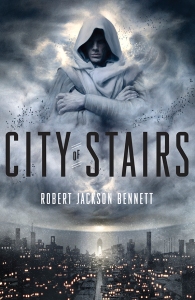Archive for the ‘Sofia Samatar’ Category
 A Stranger in Olondria, by Sofia Samatar
A Stranger in Olondria, by Sofia Samatar
published in 2013
Where I got it: purchased new
Sofia Samatar is nominated for the Campbell Award in this year’s Hugo Awards.
.
.
.
.
.
.
.
.
.
.
.
..
.
So I’ve got good news and bad news about A Stranger In Olondria. The good news is that this is some of the most beautifully poetic writing I’ve ever come across. Open the book to any random page, choose any random paragraph, and you’ll be floored by the writing. The bad news is that the story had absolutely zero hook for me. It took far too long for me to feel pulled into to what was happening. It was a strange combination of dazzling poetry skillfully disguised as paragraphs, and a muddled plot where the scenes sluggishly melted into each other. I imagine if Guy Gavriel Kay and Catherynne Valente teamed up to rewrite one year of The Adventures of Ibn Battuta, it might read something like A Stranger in Olondria.
Jevick’s family is from the southern island of Tinimavet. His father wants him to grow up to be a merchant of a new generation, so ensures the boy has an Olondrian tutor, someone to teach him the language and customs of that massive country to the north. Lunre teaches Jevick more than just writing and reading, he shares his immense collection of books, and is suspiciously silent about his past. Tinimavet does not have a written language, which makes the learning of a different one even more magical for Jevick. Before taking ship to Olondria, he has already experienced the fountains in the squares, the bustling ports, the languorous rivers, the women who pull in admirers with a flick of the scarf on their wrists. Jevick knows all of this through the books of prose and poetry that Lunre reads to him.
When the time comes for Jevick to go to Olondria, Lunre refuses to go with him. What broke that man’s heart so completely? His love for his homeland the people who reside there is obvious, why does he refuse to return? On the ship, Jevick meets a sickly girl, Jissavet, who is from a neighboring island. They share a common language and religion. Her family has spent everything they have in hopes that healers in Olondria can cure her disease.
I’m posting my thoughts on the Hugo nominated short stories all week. You can read Sofia Samatar’s nominated short story “Selkie Stories Are For Losers” over at Strange Horizons. Click here to see how far I’ve gotten in my Hugo reading.
here’s what I thought:
She knows all the stories, the one where he hides her skin in a locked trunk, the one where it’s hidden in the attic, the one where it’s in his knapsack. And always in the end, the Selkie finds her skin and returns to the sea. Our narrator knows these stories like the back of her hand, yet she adamantly refuses to share them with her closest friend Mona. And since her Mom left, she could really use a friend who isn’t interested in Selkie stories.
.
There was that magical moment when I realized exactly what the title was referring to. In Selkie stories, the reader is always meant to feel sorry for the Selkie who is trapped on land, and such stories reach their end when the Selkie finds their skin and returns to their underwater family. We’re rarely shown the other side of the equation. It’s not “loser” as in “shape of an L on her forehead”, it’s “loser” as in the one who lost something, the one who found themselves on the losing side of a conflict, of history, of the law, of magic.
.
She’s a little jealous of the Selkies in the stories, I think. That they inevitably return to their families like nothing ever happened, and that their families want them back. Everyone in “Selkie Stories are for Losers” seems to have something they are trying to return to, and failing. Here on land, we don’t have a choice – life marches on, leaving us behind.
.
I loved the unpretentious, fearless, nothing-to-prove writing style. Like the best magical realism, this could be the narrator’s exact experience, or it could be a coping mechanism for what’s happened in her life. Sometimes when reading magical realism, I really do think about the possibility that an unreliable narrator has come up with a coping mechanism. That’s not meant as an insult to the character or the story or the author, it’s just an added dimension for me when reading magical realism. It’s fun for me to think about what’s really happening in the context of the story, and what the narrator is just making up.
.
I read the story a few times, and never did learn the name of the narrator. On the one hand, unnamed narrators are a pet peeve of mine, but on the other hand it means she could be anyone – my neighbor, the waitress at that little diner, the girl giggling with her friend at the corner store.





Recent Comments